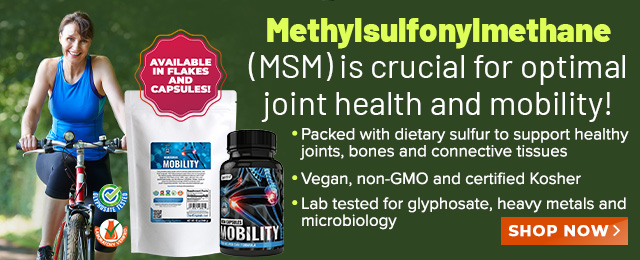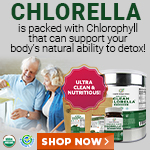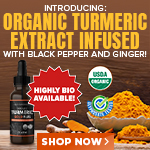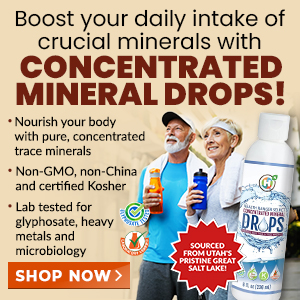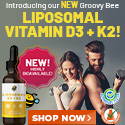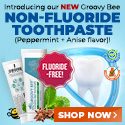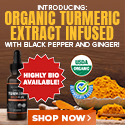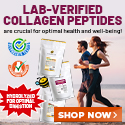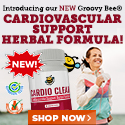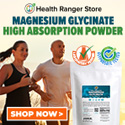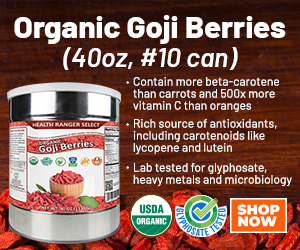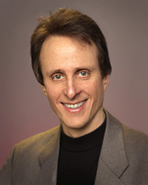
Interview with Jon Barron of Baseline Nutritionals on herbal healing, the bird flu and alternative health
 Monday, April 24, 2006 Monday, April 24, 2006by Mike Adams, the Health Ranger Editor of NaturalNews.com (See all articles...) Tags: dangerous drugs, herbal healing, alternative health |
- CLOT SHOT PLANDEMIC UNFOLDING: Fibrous, rubbery clots caused by covid injections have prion-like seeding activity
- Widespread social and economic unrest: Steve Quayle issues urgent financial warning of imminent asset collapse in new interview with Mike Adams
- DEATH by VACCINE or face PRISON time: Canadian Freedom Convoy leaders CONVICTED for protesting forced vaccination during the Covid Plandemic
- How to detox from metals falling out of the sky
- Aerosolized bioweapons? Strange “diploid biomasses” falling out of the sky in Florida captured under the microscope
- How Israeli military-connected corporations are secretly controlling your online privacy
- How the peanut allergy epidemic was fueled by faulty science and institutional arrogance
- Kiss Your Genetic Privacy Good-Bye! 23andMe Gets Green Light to Sell Your Intimate Genetic Details to Anyone They Want
- Analysis: The coming economic collapse, a mass uprising and Trump's three secret weapons to halt the growing revolt
- Thimerosal is 50 percent MERCURY and NO it has NOT been removed from vaccines - that was a BIG FAT LIE the CDC told vax skeptics to keep them vaxxed up and dying
- “Rockefeller Medicine Men”: Today’s healthcare crisis stems from the creation of the American medical establishment
- Mike Adams releases country western hit single: Goin’ Back in Time is Comin’ Home
- Global financial Ponzi scheme collapses in real time as markets plummet, Mike Adams and Steve Quayle warn of impending chaos
- EU takes aim at Elon Musk's X with potential $1 billion fine under Digital Services Act
- Defunding DEADLY mRNA jabs: Government funding for mRNA technology being scrutinized and sidelined until proven "safe and effective" for real
- European Court of Justice: Healthcare professionals who promoted or administered COVID-19 vaccines are CRIMINALLY LIABLE for any harm caused
- New York governor signs controversial gun control measure, sparking Second Amendment concerns
- Washington State expands hate crime bill but ignores left-wing violence against Tesla owners
- Aerosolized bioweapons? Strange “diploid biomasses” falling out of the sky in Florida captured under the microscope
- European Court of Justice: Healthcare professionals who promoted or administered COVID-19 vaccines are CRIMINALLY LIABLE for any harm caused
- Newly released JFK files reveal Pentagon's role in creating Lyme disease and covid in the same lab
- Analysis: The coming economic collapse, a mass uprising and Trump's three secret weapons to halt the growing revolt
- FBI imposed gag order on agents to silence Hunter Biden laptop truth before 2020 election, new chat logs reveal
- Britain’s descent into police state censorship: Parents raided for questioning their daughter’s school system online
- “Project Aldrin”: Senate probes Meta's alleged censorship dealings with China
- Kiss Your Genetic Privacy Good-Bye! 23andMe Gets Green Light to Sell Your Intimate Genetic Details to Anyone They Want
- Oncologist warns of ‘terrifyingly aggressive’ cancers in children, linked to immune suppression from COVID vaccines
- Mike Adams releases country western hit single: Goin’ Back in Time is Comin’ Home
- Utah governor allows ban on LGBT pride flags in public buildings and schools, will take effect without his signature
- AI-powered forecasting model proves more accurate than traditional systems at predicting the weather
- When antibiotics are unavailable, natural ANTIMICROBIAL compounds become essential first line defenses against infection
- German researchers find link between mRNA vaccines and GENETIC CHANGES that precede CANCER and AUTOIMMUNE DISORDERS
- Defunding DEADLY mRNA jabs: Government funding for mRNA technology being scrutinized and sidelined until proven "safe and effective" for real
- The Health Ranger releases “Vaccine Zombie” song and music video, using AI-animated zombies for the music video
- Dr. Mary Talley Bowden drops bombshells about children being permanently damaged by mRNA jabs during Tucker Carlson interview
- The hidden war above: Chemtrails, HAARP and the battle for planetary control
- Newly released JFK files reveal Pentagon's role in creating Lyme disease and covid in the same lab
- California's social media censorship law struck down: A victory for free speech or a threat to online safety?
- The Health Ranger releases “Vaccine Zombie” song and music video, using AI-animated zombies for the music video
- Dr. Mike Yeadon releases 15-minute testimony - WATCH - about genocidal intent of COVID “vaccines”
- EPA advisor admits the agency is funneling billions to climate groups ahead of Trump’s return to White House
- Rep. Nancy Mace introduces bill to ban biological males from female facilities on federal property
- Mike Adams releases country western hit single: Goin’ Back in Time is Comin’ Home
- Florida takes a stand: DeSantis proposes permanent ban on mRNA vaccine mandates
- Sugarcane extract superior to cholesterol-lowering drugs?
- Survival 101: Effective EMF blocking techniques
- OpenAI whistleblower who dissented against how the company trained ChatGPT found dead
- CONSERVATIVES SOUND THE ALARM: Big Pharma and the Left trying to force $32 billion money grab from America’s seniors into year-end spending deal
- Pilots report mysterious lights 'moving at extreme speeds' across Oregon skies
- Attorney and TikTok influencer explains how he was offered hundreds of dollars to make false claims about Trump, Republicans
- Trump reverses course on Gaza plan, says “nobody is expelling Palestinians”
- Trump expected to choose Kelly Loeffler as his agriculture secretary even though she was caught INSIDER TRADING during COVID
- MEDICAL BOMBSHELL: FDA admits Covid mRNA 'Vaccines' CAUSE CANCER
- Marketing director responsible for WOKE Jaguar rebrand is also an LGBT activist who supports Black Lives Matter
- Red Cross issues warning to stop blood plasma donations from vaccinated people
- Scientists confirm: GENIUS brain function can be spontaneously unleashed in humans without any apparent cause
- EPA advisor admits the agency is funneling billions to climate groups ahead of Trump’s return to White House
- HYSSOP: What research reveals about the health benefits of this ancient holy herb
- Two containers with completed ballots fall out of truck in Florida
- Fully vaccinated about to see “tsunami” of illness and death, warns virologist
- Global leaders unite to clamp down on “misinformation” with UN-backed Cascais Declaration
- Newly released JFK files reveal Pentagon's role in creating Lyme disease and covid in the same lab
- BREAKING: 2025 NDAA authorizes mandatory military draft of WOMEN across America… as Pentagon pursues global NUCLEAR war with both Russia and China at the same time
- Michael Yon warns of a ZIONIST TAKEOVER in Trump’s second administration
- Ozempic and Wegovy weight loss drugs are injectable LIZARD VENOM PEPTIDES that may unleash a devastating wave of organ failure… side effects align with symptoms of SNAKE BITES
- BOMBSHELL: DNA testing kits are a SCAM to develop ethnic-specific bioweapons
- The Health Ranger releases “Vaccine Zombie” song and music video, using AI-animated zombies for the music video
- Israeli soldiers accused of even more torture and abuse in the West Bank
- These 13 countries just signed an agreement to engineer a global FAMINE by destroying food supply
- NASA admits that climate change occurs because of changes in Earth’s solar orbit, and NOT because of SUVs and fossil fuels
- RFK Jr. clears key hurdle: Sen. Susan Collins backs controversial HHS nominee, signaling a new era for health policy
- Sermon 30: How Jesus reveals Caesar’s FAKE CURRENCY and FALSE AUTHORITY
Barron: Nice to be here, Mike.
Mike: For those who are not familiar with your work, can you give us a brief introduction of what you do and how you got into this?
Barron: Approximately 40 years ago I was pre-med in college. I wasn't overly dedicated, and I was becoming quite disillusioned with traditional medicine even at that time. I began exploring alternative health. Even back then I started writing on the nature of nutrition and aging. This was a personal exploration. Back then, you didn't have the choices you have now. HSI didn't exist then, a lot of the health newsletters didn't exist then, and you didn't have the number of schools. The only thing you could do was find people who were actually practicing. That was difficult because you had to get through a double blind referral to get to most of them. They were all afraid of being arrested.
Mike: Right.
Barron: It was tougher than it is now, but surprisingly, in half of the states in the U.S. it is still illegal for medical doctors to suggest alternative treatments. If a medical doctor recommends anything other than surgery, chemo or radiation for cancer in half the states in the country, he or she could be arrested. It was even more so back then, so you had to find people hidden away and start learning from them. That's what I did.
Along the way I began to do two things. First, I found most of them weren't good at writing down what they did, so I started newsletters back then -- the Lifestyles Resources Report, the Barron Report -- writing what they were doing. I actually became proficient at explaining complex things without dumbing them down. They also needed formulas, so the other thing I did was to begin working as a formulator to take what they wanted and put it in a form that was usable -- in other words, nutraceutical or herbal.
Mike: Can you explain that a little more for those that may not be familiar with what a formulator actually does?
Barron: Things tend to work better in combination. With herbs, for example, green tea and curcumin reinforce either other and make each other stronger. So you can often make things more effective, whether they are immune boosters or antioxidants, by combining things. The trick is knowing what you're doing. A lot of people work out of book knowledge. I'll give you two examples of things I see all the time where formulas are put together that don' t make sense. We get thousands of questions at jonbarron.org -- it's now running over 3,000 a month -- and we try to answer them all, but I'm not sure how much longer we'll be able to do that.
Mike: That' s quite a task.
Barron: People always want to know, "What's your opinion of this?" They'll send me some herbal formula -- let's say for intestinal health -- that has 50 ingredients in it. They'll say, "This is the most complete formula I've seen." Yes, it's very complete, but it was put together by someone who doesn't understand what they're doing. Fifty ingredients in a 500 mg tablet gives you like a ten-thousandth of a gram of each herb. And since its probably weighted to the top ingredients, so the bottom ones in there are probably just two to three milligrams each. In the industry, we call it pixie dust. They sprinkle pixie dust in the formula just to put it on the label.
Mike: I think I found pixie dust in Herbal Essences Shampoo. That may have been homeopathic, too.
Barron: Actually, we can talk about homeopathies a little bit, too. There's a knock against it that's just not true. Oftentimes what you'll see is people putting formulas together out of a book, and you'll get a formula that has no value because nothing in there is strong enough to have any value or quality. The other thing people do wrong is look in a book on intestinal health and throw in everything that looks like it's good. For example, you'll often see formulas that have probiotics and goldenseal for intestinal health formulas. Goldenseal is great because it kills bad bacteria, but it also kills good bacteria. You don' t want to take it every day. In an intestinal formula, it is killing the probiotics at the same time. So the job of a formulator is to know the things that reinforce each other and to be open to exploring new things as they are discovered and opened up, as they are all the time, and to know how to combine them in ratios with the quality you want.
Mike: Some of the largest vitamin and supplement companies in the world hire you to formulate their products. Is that how this works?
Barron: Actually, a lot of marketing companies have asked me to develop everything from colon correctors to detox formulas to antioxidants. Another issue you'll come up against is that oftentimes your goal is to create the best and budgetary restrictions will come up. You still try to create something that works, but you have to adapt to the cost. One of the nice things about creating my own company, Baseline Nutritionals, was that we could finally do this without compromise. Our slogan was, "When compromise is not an option."
Mike: Is there a URL where people can find your products?
Barron: Absolutely. It's baselinenutritionals.com.
Mike: I take it you put these products together using the finest bulk herbs and not herbs from the bottom of the barrel. You put in whatever it takes to get the desired result, regardless of cost?
Barron: Right. We sell direct, which allows us to get some of that cost back. The bottom line is that if you want results, you've got to pay for them. My favorite example is ginseng as an herb. You go on the market and you can find it for as little as $5 a pound. The good stuff -- the wild-crafted or organic -- will run $400 to $600 a pound, depending on the seasons. You can put either on your label as ginseng, but they don't produce the same results.
Mike: Isn't this true about echinacea? Isn't there huge variation in the potency?
Barron: Absolutely. There's a great test for the potency of echinacea. Every herb has its signature characteristic. There's a science called herbal pharmacognacy, where the best people can identify over 1,000 herbs by taste or smell and tell you how strong they are more accurately than any equipment. People wonder how that could be, and I just remind them to think of wine tasters.
Wine tasters' palettes are quite sophisticated and can do far better than any testing equipment known to man. It's the same thing with herbs, and I don't consider myself an herbalist, although I know probably more than 95 percent of the people who do claim to be. I can probably identify maybe 100 to 200 herbs by their signature characteristic, but the good people who really are the top herbalists can identify over 1,000. For example, think of peppermint tea. If you have two batches of peppermint, and you brew them up and one tastes like dishwater while the other has a really strong peppermint flavor, you don' t have to be an herbalist to say, "That's good peppermint, and that's not." The signature characteristic of peppermint is the peppermint flavor. The signature characteristic of echinacea is that it numbs and tingles the mouth.
Mike: I've purchased herbal tinctures from health food stores because I appreciate the taste of the herbs. Sometimes it's not enjoyable, but it's part of the experience. I've purchased products before that really don't have the taste that's supposed to be in them. It's like alcohol or water with absolutely no taste.
Barron: You're absolutely right. I actually once went into a health food store and they had 30 different kinds of echinacea -- either liquid, tablet or capsule form. I bought all 30, put the dry ones into an alcohol base and then tasted them, and out of all of them only one had any taste.
Mike: We should do a whole story on the truth behind traditional supplements. This is fascinating, Jon. I was at one of those wholesale discount club stores -- I don't want to name the name -- and they had vitamins in capsules, like fish oil supplements, that were formulated to combine fish oil extract with hydrogenated soybean oil. How's that for a supplement?
Barron: Wow.
Mike: Can you believe that?
Barron: Yep.
Mike: This was heavily promoted on an end cap display as being good for your cardiovascular health. It's insane.
Barron: There's definitely insanity. I think one of the biggest problems is -- and I'm going to try to be delicate here -- if doctors make statements about nutrition, those statements are quoted. The problem is that doctors don't know nutrition. That's not what they study. If you ask any doctor, half of them have never studied nutrition, and the other half has taken one course in medical school. That means one hour a week for six to eight weeks. If you read two good books, you know more than most doctors about nutrition.
Mike: Well said.
Barron: Doctors -- if you think about it -- control the agenda and what nutritionists learn. They are the people who basically control what food is served in hospitals. Anyone who has smelled or tasted hospital food knows it's not nutritional. It doesn't support healing, which is why many people smuggle food to friends and family in the hospital.
Mike: Yes. Hospital food can kill you. It's not an exaggeration.
Barron: It provides basic calories, protein and synthetic vitamins. It's nothing.
Mike: Again, what kinds of formulas are at baselinenutritionals.com?
Barron: The doctors I worked with -- the ones getting the best results -- had something in common. They tended not to worry about what a particular disease was. Basically, someone came in with MS, cancer or whatever, and they put these people on the same program. The idea was to take care of the whole body. Philosophically, the body is in the same design -- call it the hand of God or call it a million years of evolution -- but it's designed to take care of itself; it's designed to repair and rebuild and to get rid of disease if you don't interfere with the process. In other words, you need to give it what it needs and not give it more toxins than it can handle. These guys worked on that principle. Someone came in, and they didn't care about the disease. They put them on an overall program to basically clean everything out that was toxic and rebuild all of the major systems in the body.
Mike: Modern medicine is always calling a symptom a disease. The philosophy that I believe you're referring to, Jon, is that there is only one disease, and that is disharmony. Disharmony can be expressed in lots of symptoms, and conventional medicine can give those symptoms thousands and thousands of names and come up with drugs that can modify little chemical marks for those names, but that's not healing the patient in the way you're talking about.
Barron: There are actually two fundamental errors that are going on here. One is the medical paradigm. I heard a great description -- a bit slanted, but there's a lot of truth to it -- that medicine is coming down to nothing but numbers. You go to your doctor now and you pay for some very expensive tests, and they come back with a set of numbers. If your numbers fall outside of a comfortable range, they will then give you a drug with all kinds of side effects that won't deal with the cause but are merely designed to force that number back into a comfortable range.
Mike: That's a great description.
Barron: That's what medicine is doing now. It's basically forcing you to fall in a line of the average person. They'll do whatever it takes to get you back there.
Mike: They keep moving the numbers, too.
Barron: They do -- like cholesterol to expand the marker.
Mike: Yes, now you've got to be below 100.
Barron: There's another error that goes on, too, and it's within the alternative health community. It's the idea of looking for the magic bullet. It comes out of the medical tradition, and people are hungry for it. They keep buying into it.
Here's a great example that I talk about it in the book: Let's say you have somebody who is born with a slight genetic predisposition to heart disease. He goes through life and eats badly -- lots of hydrogenated oil, exposed to hundreds of free radicals, doesn't use any antioxidants -- and at a certain point he basically compromises his system, and symptoms start to appear. He may start having chest pains or shortness of breath, and he goes to the doctor, who says, "Oh my god -- there is damage, blockage, hardening of the arteries. You need a bypass." The patient doesn't buy this, and he explores and discovers an antioxidant called pycnogenol. He takes it, because one of the factors that contributed to his heart disease was free radical problems, and the antioxidants help with that and move him back up, not to full health, but to a point where he doesn't experience symptoms anymore. At this point he says, "I'm cured. This is a miracle. I'm going to join this company, and I'm going to get everyone I know on pycnogenol because it cures heart disease."
So he becomes an evangelist, telling people this is the magic bullet for heart disease. Some people experience similar results, but eventually he meets Sue. Sue was also born with a genetic predisposition to heart disease, but she eats really well -- the Mediterranean diet -- and takes antioxidants. The problem is that she was CEO for one of the dot-com agencies that went bust and lost millions of dollars, under incredibly high stress. She starts to show symptoms, and she starts to take the pycnogenol. She has the same symptoms, same problem, with different causes. Free radicals were not the issues for her; stress was the big one. She doesn't get any results. She says it's bogus; it's a placebo. She goes to her doctor, has a bypass and feels better. The same condition, the same supplement, two entirely different results. That' s the problem when you start looking at disease in isolation. This is why treating the body as a whole and putting it back in balance, as you said, is the key.
Mike: Well said, Jon.
Barron: That' s what we do at Baseline Nutritionals. Basically, I will make recommendations if someone else is doing something well already; I have no need to duplicate what they do. If I think we can produce it better, or it's not easily available, we will produce it at Baseline Nutritionals. We take the design to optimize the health of all of the major systems in the body to basically get your health back in line.
Mike: I'm guessing there must be a detox or intestinal component to all of this at the beginning.
Barron: There is. There are several detoxes. One is the intestinal that you mentioned. Along with that, we recommend heavy metal detox. We can talk more about that later. We just had clinical studies done on the tincture for heavy metal detoxes. The results were pretty astounding. We had 50 people on it for six weeks. From what I can remember, mercury ran an average of 92 percent removal with 17 of the 50 people getting 100 percent removal.
Mike: How are you measuring the removal? Hair or urine?
Barron: Urine. We didn't do the testing ourselves. We hired a service to run it impartially. They also found good numbers for lead and aluminum. Another thing is that when you get the heavy metals out, they play a major role in lowering pH. The pH went up dramatically in these people, which is a big thing for health.
Mike: Which is more alkaline.
Barron: Yes, going to a more alkaline state is better for health. Another detox we have is an international liver detox, along with a blood cleanse. The liver detox is probably the one that will produce the biggest change in people's health. It's the one most people feel. It tends to be hard for people to do. Actually, my wife and I, for years, would do it after the holidays, beginning in January. I don't care how good you are, how dedicated you are or how healthy you are, starting with Thanksgiving through Christmas, your diet will change. It's tough to avoid unless you're a hermit. If you have family and friends, your diet will change. The problem is after six weeks, you're on a roll. Come January, it's really tough to start to break that. You're eating less well, but come January you just sort of keep going.
We found it was really useful to combine a five-day fast with the liver detox. It was a good time to clean out all the bad stuff you put in and break that habit. My wife and I would do that, and about four years ago, some friends heard about it and asked to join in. Ten people joined us, and then I decided to open it up in the newsletter and asked people all over the world to join. It's become a significant event, with several hundred people -- last year they were from 23 countries -- joining in. It's kind of fun. We support each other. We're all doing it together. We walk people through it day by day through the internet.
Mike: I might be interested in joining in that event when it comes up in January, just in terms of reaching out to a lot of readers who could join in.
Barron: If you're going to do one, it's fun to do it as a group. It's easier to stick with it. Normally, what I recommend for detoxing is sort of the idea of doing a spring, summer, winter, fall health cleaning. I alternate the detoxes, so I'll do two that are the colon and heavy metal detox and then alternate it with two that are liver and blood cleanse for the year. As a group, we do the liver/blood one in January.
Mike: Of course, all the products that are used in this are from Baseline Nutritionals?
Barron: A lot of them are. I recommend some products outside of Baseline, too, but we provide products. For the colon, for example, there is an activation formula and a detox that draws out the waste and for heavy metals we have the Metal Magic. For the liver, we have Liver Tincture and a tea and a blood cleanser, and people can make the garlic and oil drinks, which are actually the key component, at home on their own.
Mike: I'm going to order some of these today and try these myself. I'm very intrigued.
Barron: If you like tasting things, I can' t say anything nice about the taste of the blood cleanser.
Mike: I'm not looking for an amusement park ride in my mouth. I want to taste the real medicine.
Barron: You will. These are as strong as it gets.
Mike: One thing I'm always on the lookout for is a new recommendation for a tincture that can boost immunity or have a strong anti-viral effect on the bird flu. So many people are concerned about the bird flu, and my advice has always been to get healthy now, before the bird flu hits. What can people buy that can assist them with an anti-viral effect?
Barron: One thing about the bird flu that you need to understand is that it is different from any other flu, so that changes the recommendation. Most flus do not kill directly. What they do is weaken the immune system and the lungs, allowing opportune bacteria to take root, and people die from a secondary bacterial infection.
The bird flu is different. It's really important to understand that it's coming, but it may not be this year. It may be next year, or it may be five years. It may not even be the bird flu, but something like it. The bird flu right now is mimicking the Spanish flu of 1918 and 1919 that killed 50 million people. It kills directly.
Now, the interesting thing -- and I predicted this in the newsletter -- is that governments miss the key point here. They talk about vaccinating people and targeting the very old and the very young -- the people that we consider the most vulnerable in normal flus. The interesting thing about the Spanish flu and bird flu is that it's more likely to kill healthy people, because the viral load becomes so high, it over-stimulates the immune system. The healthier your immune system, the bigger the response. It creates what's called a cytokine storm. Your immune system tears up your lungs and you suffocate.
Mike: This is why so many healthy soldiers were dying in 1918.
Barron: Yes, and actually pregnant women were the largest group. Women in their prime. You want to build your immune system. I'm not saying, "Don't have a good immune system." You just also have to take something to take the viral load down. You have to use antipathogens with it. If all you do is use immune boosters, you're actually probably more at risk. It's important for people to understand that immunity won't protect you from getting it. A lot of people who feel that they have strong immune systems and won't get it, actually probably already have the antibodies to most flus. The fact is there's been nothing like the avian flu that's out there for about 100 years. There's no one around today who has a natural immunity to it. It's only a question about how well you deal with it.
Mike: Do you remember reading about the 1918 flu? An interesting fact is that 6 percent of the people who actually survived with the flu antibodies were symptomless. So 6 percent had no symptoms whatsoever. Do you think any percentage of people today will have symptomless experiences with the bird flu?
Barron: I actually think it is quite possibly likely. You actually see it even with birds, in different species. For example, ducks never show any symptoms. Let's put it this way: There will be people who will experience minimal symptoms. If you can take the viral load down, the symptoms won't be that strong.
Mike: So what do you recommend for reducing the viral load? Do you have any products that help that?
Barron: I do. If you look at the newsletters and go to jonbarron.org, I recommend using immune boosters, and there are all kinds of immune boosters. Despite any reports you may have read, echinacea is a great immune booster. There are a number of immune boosters and medicinal mushrooms, such as maitake mushrooms. You probably want to use a number of them because they all build different parts of the immune systems. The antipathogens -- the things that are known to kill viruses in particular -- include garlic, and, interestingly enough, they have reports in Korea of people who basically kept their birds alive, even though avian flu is normally 100 percent fatal for birds, by feeding them kimchi, which is has a lot of garlic.
Mike: Wow.
Barron: Yeah. It's basically a sort of fermented cabbage and high-garlic food. We also know that oil of oregano, olive leaf extract and grapefruit seed extract can all kill the avian flu virus. We also just had reports that ginger actually will knock out the avian flu virus. So one of the things that I formulate is sort of a variation of a formula that Doc. Christopher called his Plague Formula. It's concentrated garlic extract -- 30 cloves of garlic -- and it's got tons of ginger and olive leaf extract in it. It was not designed for the avian flu; it was designed sort of like Doc. Christopher's formula for general flu and illness.
Mike: Those are three of the ingredients that I've been recommending in my bird flu protection book. What's the name of that product?
Barron: Super ViraGon.
Mike: That must have a taste that just wakes you up.
Barron: It does. It also has habaneros in it. It's actually spicy. You can have it with tomato juice or orange juice. I don' t recommend taking it straight. It's a little tough that way.
The best way to handle viruses, by the way, is to catch them early. Everybody knows the day before that virus hits. You can feel it coming on -- a headachy feeling, a scratchy throat, the sniffling. If you hammer the virus hard that day -- and for a couple of days after -- you can stop it from ever hitting. It's like anything; it's much harder to get rid of once it's fully established. If you wait until it fully hits, you're going to have to work much harder to shorten its time. If you hammer it with antipathogens when you're first getting the symptoms and make sure your immune system is jacked up, nine times out of 10, it will hold it. That's really important.
Ben: You said earlier that echinacea has had some resistance lately. Could you talk about that?
Barron: There were a couple of studies that the FDA has sort of grabbed on to, and then the press has grabbed on to, that knock the value of echinacea for preventing colds or boosting the immune system.
Mike: They were using really tiny doses of echinacea, right?
Barron: Yes. They were doing a number of things. One, they were creating their own echinacea tincture. I can just hear the uproar if I created my own version of a drug to test. This is not their expertise. Two, they were using small doses. Another study they did was very interesting. They got their own echinacea and they tested college students -- basically students who were likely to be in the prime of immune health. They gave them echinacea and injected cold viruses into their noses, instead of doing a simple test of the immune system by doing a white cell count. If someone has a compromised immune system, give them an echinacea formula and check them a week later. It's really simple.
Mike: There are all sorts of clever ways people can do studies to discredit herbs or supplements. They can use synthetic vitamin E, they can disqualify anyone who is healthy, or they can do tests on people who are about to die. These are all things that have happened.
Barron: Yes. Many things are done to discredit alternative health. There's one other big thing that I think is worth mentioning. Invariably, alternative health works best when people do it as part of a protocol. Rarely are people told to just take one herb, like echinacea. It's usually part of a formula just like I'm recommending, along with the antipathogens. Alternative cancer treatments are even more involved -- using nutrition supplements, antioxidants and particular herbs. There may be 10 things in the protocol. What the medical people like to do is pull them out one at a time and test them individually.
When they test, they have criteria that determine if something is a placebo. It needs to be effective more than 30 percent of the time. Interestingly enough, using chemotherapy for lung cancer is beneficial less than 1 percent of the time, which would make it one of the biggest placebos in history. Yet, they recommend it when anyone has lung cancer.
That aside, here's an interesting concept: Alternative health tends to be additive. Medicine tends to be subtractive. In other words, you do chemotherapy and it pretty much destroys your immune system, eliminating the option of using the immune system to fight the cancer. Alternative health tends to be additive. As I said, you use protocols. You may have 10 things that, if tested alone, are only 10 percent effective each. Seven of them added together will give you something that may be 70 percent effective. You test each one individually, and each one comes in at 10, and they are all rejected by medical testing. So a protocol may be 70 percent effective, but they test each piece individually, and each piece fails the 30 percent test. The net result is the trashing of a protocol that works 70 percent of the time.
Mike: Now, people can find more of this in your book, right? Lessons from the Miracle Doctors.
Barron: That's actually a summation of everything I learned working with the health practitioners, taking what they did and putting it down in as short a form as I could. It's only 180 pages at the moment, and it's selling the story of what you need to do, chapter by chapter -- here's how you rebuild the intestinal tract, here's what you need to do with enzymes, here's what you need to do to make your liver function.
Mike: Where do people get this book?
Barron: They can download the book for free, at jonbarron.org. If they don' t like printing out all those pages, they can order it from Amazon.com.
Mike: What's the price?
Barron: I think Amazon is selling it at about $12.95, and if people go to Baseline Nutritionals with any order, they can buy the book for $6.95.
Mike: People are always interested in where we earn our money, particularly in the natural industry. You seem to have a lot of tinctures and supplements. Is that your revenue model?
Barron: Yes. I try to keep them as separate as possible. At the foundation, jonbarron.org, there are just a couple of references to Baseline Nutritionals to cut down on the questions. What would happen was everyone was asking, "Where can we buy the tings you talk about?" In general, the foundation is not product-oriented. It's purely information. Baseline Nutritionals sells the products. I do consult and I produce private label brands for companies. That's where I do make money. You're right; it is an issue. People want to know.
Mike: Is your foundation a nonprofit? You accept donations there, too.
Barron: That's right.
Mike: Ben has a couple of questions for you, too.
Ben: One of the problems I've noticed since I've been involved with natural health with Mike is that the general public has this overwhelming need to just take doctors at their word, whether they are being completely educated or not. How do you think people can overcome this predisposition to just accept a doctor when he says, "Oh, you need chemotherapy."
Barron: I think some of that is happening now, Ben. In fact, about five or six years ago, for the first time in history, people voluntarily went to alternative health practitioners more than they voluntarily went to medical doctors. If you pull out the things that are paid for and have to go to doctors, people voluntarily chose to go to alternative health and ask their doctors about alternative health.
Mike: You always hear in the press about some new study showing that, "These herbs, or these nutritional supplements, are interfering with the drugs." Isn't it the drugs that are interfering with the herbs?
Barron: You're absolutely right. The key thing is what they're saying. It's not that they are interfering, but they say they are dangerous. It's amplifying the side effect of the drug. The real question is, is it St. John's wort that is dangerous or is it the drug?
There are times that drugs are needed, and there are times that doctors are needed. I am not naïve in this regard. I was lecturing in a real hospital, at Notre Dame in Indiana. Originally, the oncology department was calling me in. They wanted me to talk to them directly. They invited the cardiovascular department to the talk. Then they opened it to the hospital at large, and then they invited the public. At this point, I started getting very nervous. Here's a forum with a lot of doctors and the public, and they wanted to use it to attack me or attack alternative health. I was absolutely unprepared for what happened. I gave my talk, opened it up for Q&A, and someone from the citizenry raised their hand and said, "Dr. Barron," -- I'm not a doctor, but everyone wants to call me a doctor -- "When are we going to be able to stop these murderous doctors, drug cartels and hospitals from killing us?" Unfortunately, I'm a guest of the hospital.
Mike: Of course.
Barron: I just suddenly watched all of the doctors sit back in their chairs, folding their arms, waiting for what I had to say. I used an analogy I have used ever since because it works. I said, "You need to understand there are times only a doctor will do. If your name is John Wayne Bobbit, you are far better off with a surgeon after your wife adjusts you than an herbalist." That's it. There are things that doctors do. They can even help with things like diabetes, which mostly could be managed if people changed their lifestyle, but there are people who won't do that. They won't adjust; they won't do the things they need to do, in which case they are better off taking the medication that regulates their blood sugar than dying. There's a role for doctors.
Mike: I have a question on this. You see this in ads, like ads for the cholesterol drugs: "When exercise and changes in diet aren't enough, ask your doctor about this drug." They are always saying, "when exercise and food aren't enough." I get the feeling that most people aren't trying.
Barron: There are a couple of other issues. One is, sometimes it's genetic. People have a predisposition. Diet only regulates about one-fifth of your cholesterol level. Most of it is regulated by your liver, so you need to get the liver in line, which I always find interesting, because the major side effect of the cholesterol drug is that it destroys the liver. The back end issue that's more important -- really, really fundamental -- is that cholesterol is not necessarily the criminal it is made out to be. It is primarily guilty by being found at the scene of the crime.
If you really want to drive your doctor crazy when they are recommending cholesterol drugs, ask the doctor, "If cholesterol is clogging my arteries, why don't my veins ever clog?" This is worth thinking about. If it were cholesterol that was the problem, would it not also clog the veins? The fact is, it's not the problem. It contributes to the problem. If your arteries are narrowed and you have high levels of cholesterol, it makes your blood very thick. It increases the chances of a heart attack or a stroke. The problem is damage to arterial walls. The difference is arteries contain muscle tissues, and veins do not. What contributes to damage to the arterial wall?
Step back for a second. Why does that cause a problem? Because your body has a defense mechanism; it does not want anything to penetrate the arterial wall. Like a submarine that might breach, it will patch it with cement. That cement is plaque made from cholesterol, minerals such as calcium and fiber. That's what it is -- a patch. It's a response to a condition in the arterial wall. Again, doctors deal with symptoms, not the cause. If you get rid of the pumps in the arterial walls, plaque goes away, and cholesterol is not the problem.
Things that could damage the arterial walls include acidic body levels. If your diet is basically acidic, your blood won't change much. If it changes more than a couple of points, you die. All the soft tissue -- the muscle tissues -- can go very acidic. If your body is acidic, it won't clear lactic acid from the muscle tissue in the arterial walls quickly. If lactic acid hangs around, it starts to damage the arterial wall. The other big one that we all are talking about right now is general systemic inflation. Inflation is a trigger for damage and repair. If you can basically take the inflammatory condition in your body down, and there are ways to do that, you tend to minimize damage to arterial walls, and the arteries will clear.
Mike: Are you talking about the C-reactive proteins and inflammation?
Barron: Yes, that's how they are measuring inflation. Higher elevated levels of C-reactive protein indicate a state of inflammation.
Mike: Again, we're talking with Jon Barron. You can find his information and philosophy at jonbarron.org. He's the author of Lessons from the Miracle Doctors, which is a free download at his website. He is also the director of the Baseline of Health Foundation, at baselinenutritionals.com. Jon, you've given us a wealth of information here, as well some entertaining stories to go along with it.
Barron: It's fun. The information is not only important, but it shouldn't be dry. People have to understand it and be excited about it or they won't act.
Mike: Absolutely. I hope we can do this again. It sounds like we just touched the surface.
Dangerous drugs at FETCH.news
Get independent news alerts on natural cures, food lab tests, cannabis medicine, science, robotics, drones, privacy and more.
More news on dangerous drugs
 About the author:Mike Adams (aka the "Health Ranger") is a best selling author (#1 best selling science book on Amazon.com) and a globally recognized scientific researcher in clean foods. He serves as the founding editor of NaturalNews.com and the lab science director of an internationally accredited (ISO 17025) analytical laboratory known as CWC Labs. There, he was awarded a Certificate of Excellence for achieving extremely high accuracy in the analysis of toxic elements in unknown water samples using ICP-MS instrumentation. Adams is also highly proficient in running liquid chromatography, ion chromatography and mass spectrometry time-of-flight analytical instrumentation.
About the author:Mike Adams (aka the "Health Ranger") is a best selling author (#1 best selling science book on Amazon.com) and a globally recognized scientific researcher in clean foods. He serves as the founding editor of NaturalNews.com and the lab science director of an internationally accredited (ISO 17025) analytical laboratory known as CWC Labs. There, he was awarded a Certificate of Excellence for achieving extremely high accuracy in the analysis of toxic elements in unknown water samples using ICP-MS instrumentation. Adams is also highly proficient in running liquid chromatography, ion chromatography and mass spectrometry time-of-flight analytical instrumentation.
Adams is a person of color whose ancestors include Africans and Native American Indians. He's also of Native American heritage, which he credits as inspiring his "Health Ranger" passion for protecting life and nature against the destruction caused by chemicals, heavy metals and other forms of pollution.
Adams is the founder and publisher of the open source science journal Natural Science Journal, the author of numerous peer-reviewed science papers published by the journal, and the author of the world's first book that published ICP-MS heavy metals analysis results for foods, dietary supplements, pet food, spices and fast food. The book is entitled Food Forensics and is published by BenBella Books.
In his laboratory research, Adams has made numerous food safety breakthroughs such as revealing rice protein products imported from Asia to be contaminated with toxic heavy metals like lead, cadmium and tungsten. Adams was the first food science researcher to document high levels of tungsten in superfoods. He also discovered over 11 ppm lead in imported mangosteen powder, and led an industry-wide voluntary agreement to limit heavy metals in rice protein products.
In addition to his lab work, Adams is also the (non-paid) executive director of the non-profit Consumer Wellness Center (CWC), an organization that redirects 100% of its donations receipts to grant programs that teach children and women how to grow their own food or vastly improve their nutrition. Through the non-profit CWC, Adams also launched Nutrition Rescue, a program that donates essential vitamins to people in need. Click here to see some of the CWC success stories.
With a background in science and software technology, Adams is the original founder of the email newsletter technology company known as Arial Software. Using his technical experience combined with his love for natural health, Adams developed and deployed the content management system currently driving NaturalNews.com. He also engineered the high-level statistical algorithms that power SCIENCE.naturalnews.com, a massive research resource featuring over 10 million scientific studies.
Adams is well known for his incredibly popular consumer activism video blowing the lid on fake blueberries used throughout the food supply. He has also exposed "strange fibers" found in Chicken McNuggets, fake academic credentials of so-called health "gurus," dangerous "detox" products imported as battery acid and sold for oral consumption, fake acai berry scams, the California raw milk raids, the vaccine research fraud revealed by industry whistleblowers and many other topics.
Adams has also helped defend the rights of home gardeners and protect the medical freedom rights of parents. Adams is widely recognized to have made a remarkable global impact on issues like GMOs, vaccines, nutrition therapies, human consciousness.
In addition to his activism, Adams is an accomplished musician who has released over a dozen popular songs covering a variety of activism topics.
Click here to read a more detailed bio on Mike Adams, the Health Ranger, at HealthRanger.com.
Take Action: Support Natural News by linking to this article from your website
Permalink to this article:
Embed article link: (copy HTML code below):
Reprinting this article:
Non-commercial use OK, cite NaturalNews.com with clickable link.
Follow Natural News on Facebook, Twitter, Google Plus, and Pinterest
Science News & Studies
Medicine News and Information
Food News & Studies
Health News & Studies
Herbs News & Information
Pollution News & Studies
Cancer News & Studies
Climate News & Studies
Survival News & Information
Gear News & Information
News covering technology, stocks, hackers, and more



"Big Tech and mainstream media are constantly trying to silence the independent voices that dare to bring you the truth about toxic food ingredients, dangerous medications and the failed, fraudulent science of the profit-driven medical establishment.
Email is one of the best ways to make sure you stay informed, without the censorship of the tech giants (Google, Apple, Facebook, Twitter, YouTube, etc.). Stay informed and you'll even likely learn information that may help save your own life."
–The Health Ranger, Mike Adams












